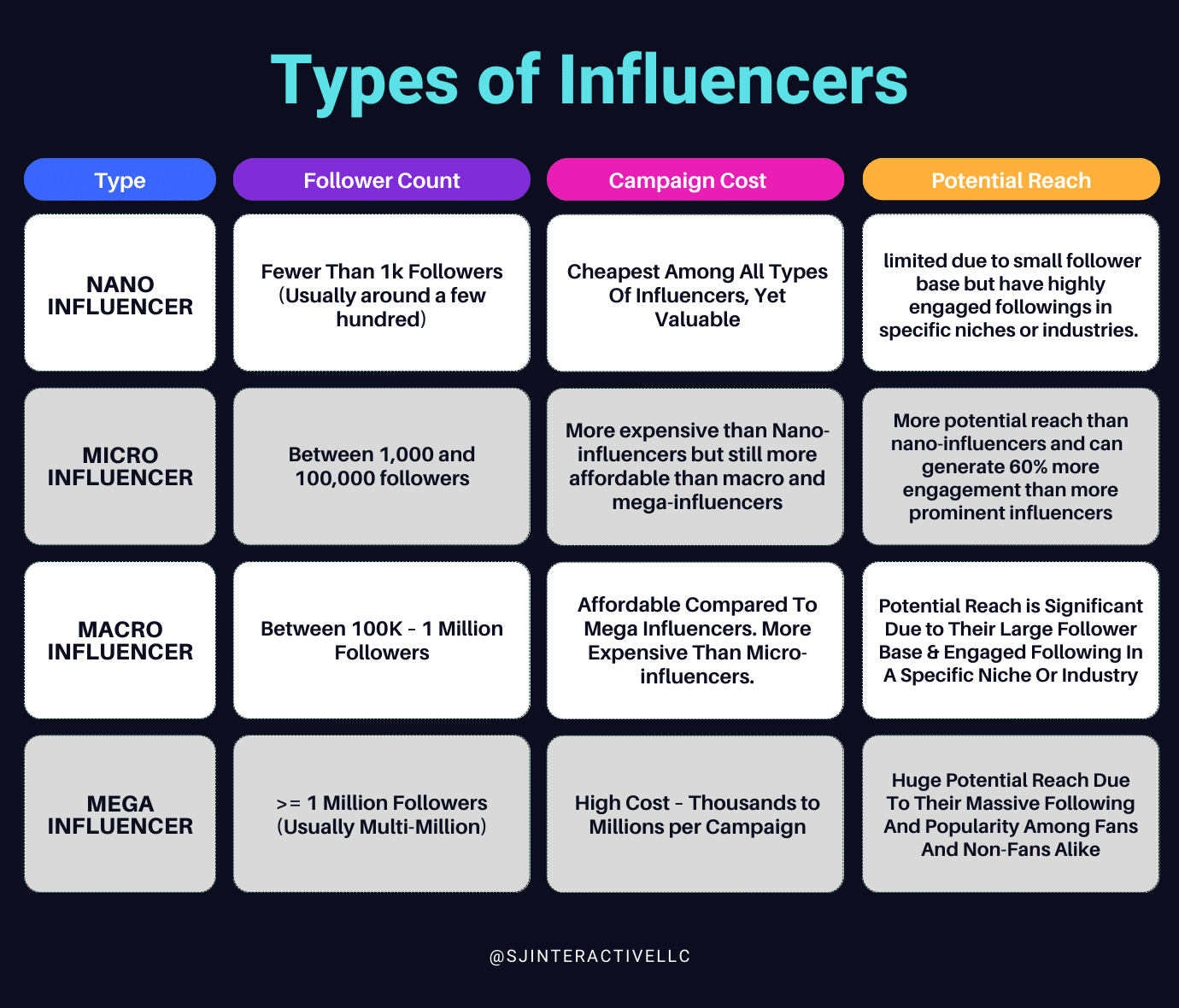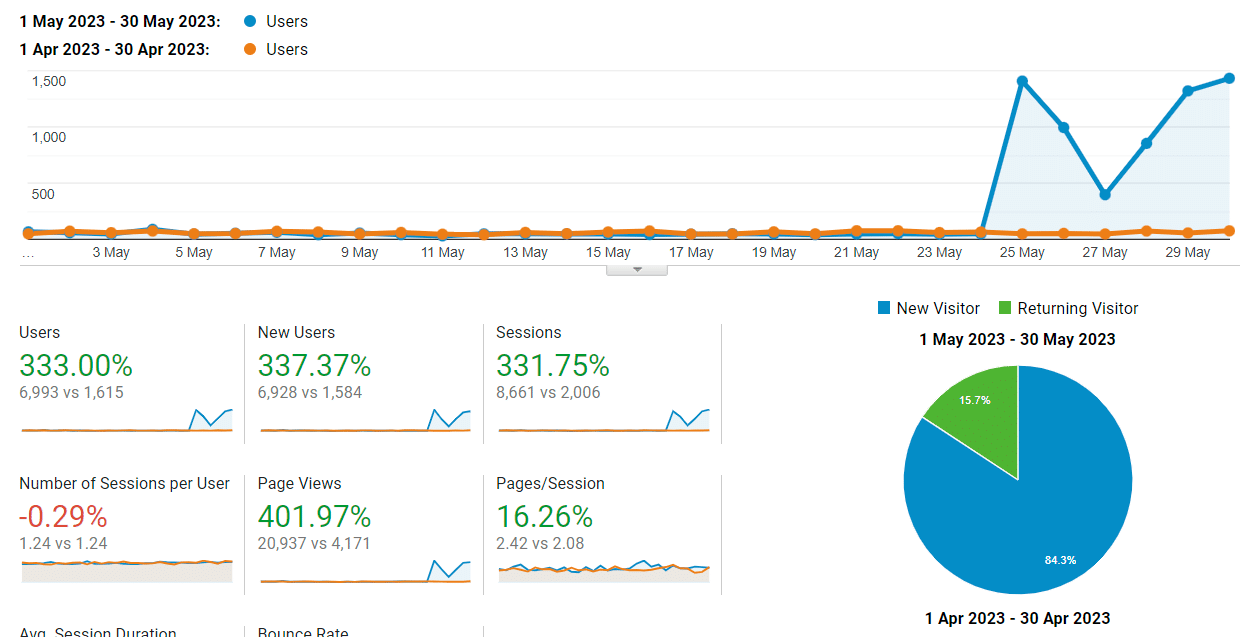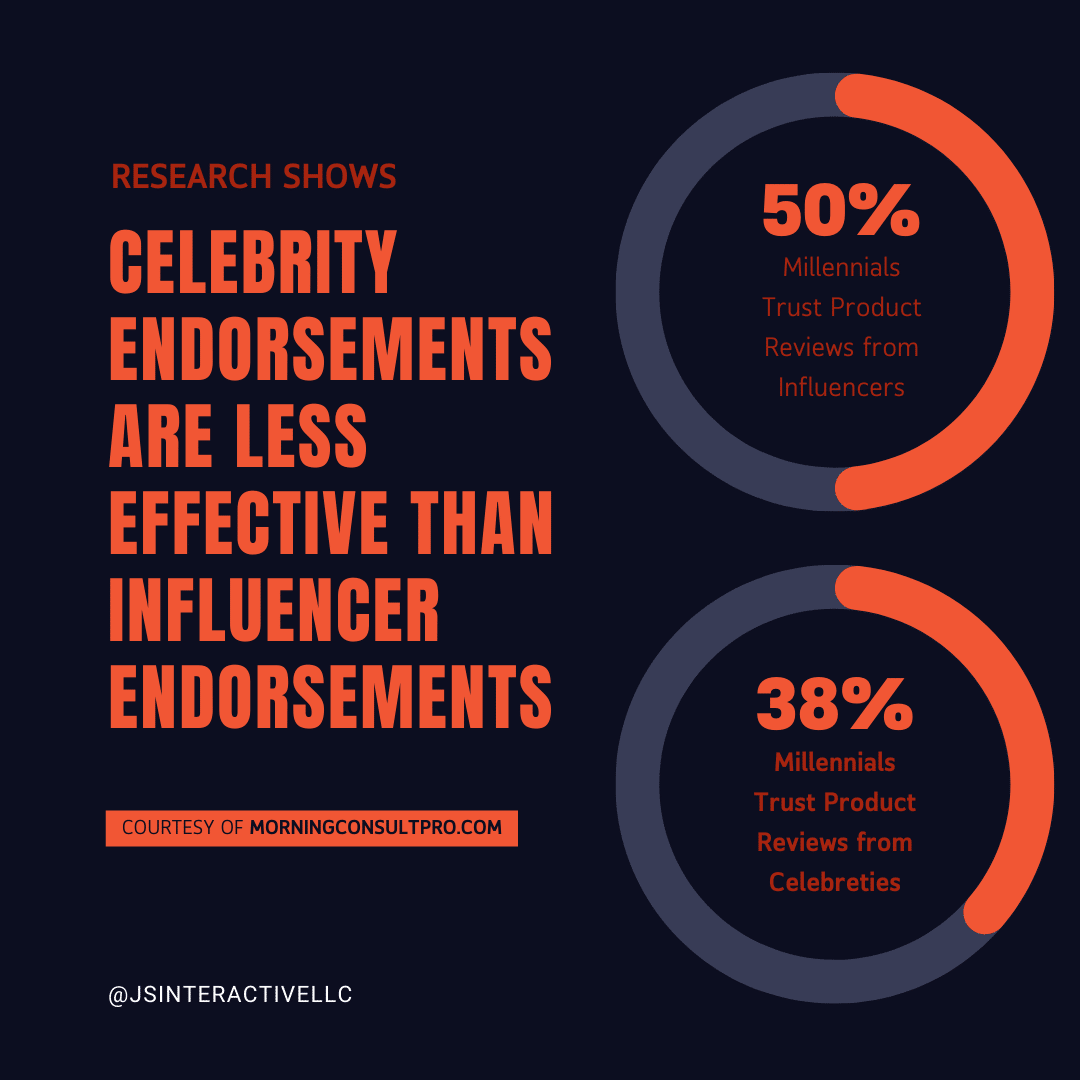Weighing the Pros and Cons of Influencer Marketing: Is It Right for You?

How’s the extended warranty on your car holding up? If you’re not sure, just give it a minute, and an unsolicited ad will surely make its way to your inbox trying to sell one to you!
Don’t you hate being hounded by salespeople? There’s a reason more than 65 million people pay for ad blockers.
Salespeople are not trusted. Advertising can feel like a dirty word.
So, how can you – a small business owner – build trust and credibility while building your brand? One strategic way is to let others sing your praise with influencer marketing.
Influencer marketing has earned its seat at the table, especially when you consider that 72% of Millennials and Gen Z follow influencers on social media.
Is influencer marketing the strategy you need to take your brand to the next level?
It depends!
Influencer marketing works wonders when done right, but it can backfire if not handled carefully.
Understanding its benefits and drawbacks is crucial if you’re considering incorporating this tactic into your social media marketing plan.
According to a report from Influencer Marketing Hub, 89% of marketers find ROI from influencer marketing comparable to or better than other channels. But does that mean it’s suitable for every business?
Here’s what you need to know.
Table Of Contents:
- What is Influencer Marketing?
- Types of Influencers
- The Role of Influencers in Shaping Consumer Opinions
- Pros of Influencer Marketing
- Cons of Influencer Marketing
- Strategies for Successful Influencer Marketing Campaigns
- Best Practices for Working with Influencers
- Tracking Your Influencer Marketing Success
- Pros and Cons of Influencer Marketing: Is It Right for You?
What is Influencer Marketing?
Influencer marketing is a strategic approach where brands collaborate with influential individuals, aka influencers, who have a substantial following on social media. These influencers possess credibility and reach, which brands leverage to promote their products, services, or messages to an engaged audience outside their own.
The goal is to tap into the influencers’ authority and ability to connect with their followers to generate brand awareness and credibility while influencing consumer behavior.
4 Types of Influencers
Influencer marketing has become a popular way for brands to reach their target audience and increase brand awareness. However, not all influencers are created equal. You could choose to work with several types of influencers, each with its advantages and disadvantages.
1. Nano-Influencers
Nano influencers typically have fewer than 1,000 followers on social media platforms. While they may not offer the same reach as more prominent influencers, nano-influencers often have highly engaged followings in specific niches or industries. Due to their smaller follower base, working with nano-influencers could be more cost-effective than other influencer campaigns.
2. Micro-Influencers
Micro-influencers have between 1,000 and 100,000 followers on social media platforms like Instagram or Twitter. They typically have a highly engaged following in a specific niche or industry. Micro-influencers may be more affordable than more prominent influencers but can still provide valuable exposure for your brand.
3. Macro-Influencers/Power Middle
A macro influencer has a following of between 100,000 and one million followers. They may not have the same fame level as mega-influencers, but they can still provide valuable exposure for your brand.
4. Mega-Influencers/Celebrity Influencers
Mega-influencers are celebrities or well-known public figures with millions of followers on social media platforms. Working with mega-influencers comes at a high cost but offers significant exposure for your brand due to their massive following and popularity.

How Influencers Shape Consumer Opinions
Influencers aren’t just popular; they’ve got clout. They shape consumer opinions like playdough and drive brand awareness faster than you can say “viral.”
The relationship between influencers and their followers goes beyond mere admiration.
Influencers have established themselves as trusted sources of information and inspiration, cultivating a sense of authenticity and relatability that resonates with their audience.

As a result, when influencers endorse or express opinions about a product, service, or brand, their followers often perceive it as a personal recommendation rather than traditional advertising.
Take the above example of the TikTok video posted by Nate Petroski, an off-grid homestead influencer known for his sustainable living tips and DIY projects. He recently worked with one of our clients, BurnRight, and posted his experience using their stainless steel incinerators to completely obliterate two treestumps in his yard. This post saw a lot of traffic since its initial publication on TikTok, with 62.0K “likes” on the platform, 330 comments, and 815 shares.
Sure, that’s massive traffic for Nate, but what about BurnRight?
In May 2023, BurnRight saw a jump in unique pageviews of roughly 453%! Their number of new leads for the month jumped just over 300%, with the number of completed purchases jumping by 183%.

Sure, the numbers can and will vary by campaign and who you choose to work with, but the evidence is there! Working with the right influencer can help you reach (and even exceed) your business goals.
Authenticity Leads to Success
A key ingredient here is authenticity. Influencers sharing their genuine experiences with products or services resonates more powerfully with audiences than traditional advertising methods ever could.
The impact of influencers on consumer opinions is rooted in the power of social proof. Consumers tend to seek validation from others, especially those they admire and trust. Influencers, with their established credibility and expertise in specific niches, effectively tap into this psychological tendency, significantly influencing their followers’ purchase decisions, preferences, and overall brand perceptions.
Take the BurnRight example once again. In his post, Nate specifically states that he shares things so his viewers “know they are out there” and that there is never any pressure to go out and buy them. It’s this authenticity that encourages action!
If your audience sees a respected influencer endorsing your brand, they’re more likely to trust it. Now, it’s necessary to point out that influencer and celebrity endorsements aren’t the same thing – and as a result, they don`t carry the same weight.
Research shows that celebrity endorsements are less effective than influencer endorsements, with 50% of millennials stating that they trust product recommendations from influencers vs. 38% who trust product recommendations from celebrities.

Consumers tend to perceive celebrity endorsements as a more traditional form of advertising. They are paid to say what the brand wants them to say.
Influencer endorsements, on the other hand, are perceived as authentic and trustworthy because they come from a source that their audience can personally relate to.
The Pros of Influencer Marketing
Influencer marketing is not just a buzzword. It’s a game-changer in the digital landscape, and here’s why:
- It gives your brand boosted visibility and credibility. You’re essentially borrowing an influencer’s audience to amplify your message. People trust influencers’ opinions more than brands, so you can benefit from their endorsement.
- It helps foster relationships that last long-term. You’re now engaging with an influencer and their community to create a meaningful connection. Establishing these connections increases your chances for success in the future.
- It adds a human touch to your digital strategy. Influencer marketing is all about connecting with people on a personal level, which can be hard to do in the online environment.
Of course, those are just a few of the top reasons influencer marketing is such a powerful tool for your brand. Below are tangible benefits you can expect to reap from an influencer marketing strategy:
Improved Engagement Rates
No more shouting into the void. With influencers on board, you’ll see better engagement rates because their followers actually listen to them. They’ve built trust over time – something that ads can’t buy. Influencers have earned the trust of their followers through consistent, authentic content and meaningful interactions.
Unlike traditional ads, which are often perceived as intrusive or sales-driven, influencers have established a rapport with their audience based on shared interests, relatability, and expertise. As a result, when influencers recommend or endorse a brand, their followers pay attention and trust the message conveyed. This trust translates into higher engagement rates, with followers actively liking, commenting, sharing, and participating in discussions sparked by influencer-led content.
Targeted Reach
Influencers specialize in specific niches, attracting followers with common interests, passions, and demographics. This targeted reach allows you to connect with a relevant audience that aligns with your brand’s target market. By partnering with influencers who cater to your desired audience, you can ensure that your brand message reaches the right people, increasing the likelihood of engagement and conversions.
Note: Choose wisely though; align with influencers whose values mirror yours for maximum impact.
Niche Expertise
Influencers have invested significant time and effort in cultivating their expertise within specific niches. They understand their audience’s preferences, interests, and pain points. This knowledge enables influencers to curate content that precisely addresses the needs and desires of their followers.
By partnering with influencers, you gain access to this specialized knowledge, allowing you to create tailored marketing messages that resonate on a deeper level and avoid the pitfalls of generic or misaligned content.
User-Generated Content (UGC)
One of the most significant benefits of influencer marketing is the access it provides to authentic user-generated content (UGC). UGC is content created by consumers or followers of influencers that showcases their experiences, interactions, and testimonials with your products or services.
This type of content carries inherent credibility, resonates well with audiences, and positively impacts conversion rates. Furthermore, leveraging UGC through influencer marketing can save you valuable time that would otherwise be spent on extensive creative brainstorming.
Affordable Marketing Strategy
Rather than investing in expensive traditional ad campaigns, influencer marketing can be a cost-effective alternative with the potential to yield higher engagement rates, especially when working with micro-influencers who often have higher engagement rates at lower costs.
Additionally, influencers often have access to unique targeting capabilities that can help you reach your desired audience with greater precision and efficiency—saving you time and money on your marketing efforts.
The Cons of Influencer Marketing
Influencer marketing is undoubtedly gaining momentum as a go-to strategy for enhancing digital presence. But let’s face it. It’s not always smooth sailing. As you dive into this dynamic landscape, it’s crucial to be aware of the potential pitfalls and challenges that may arise, including the following:
The Price Tag Can Be Hefty
One notable concern in influencer marketing is the substantial costs associated with partnering with influencers. Prominent A-list influencers often command exorbitant fees for a single post or campaign. Even micro-influencers with smaller but highly engaged audiences may not come cheap.
These costs can present a significant obstacle if you’re operating on a tight budget or with limited resources. It is essential to evaluate the return on investment carefully and ensure that the potential benefits outweigh the financial implications before committing to influencer partnerships.
Finding Authenticity in the Sea of Fakes
With the rise of manufactured influence and artificial practices, it is crucial to discern whether an influencer has genuinely earned their impact through authentic engagement or has resorted to artificial means.
Associating your brand with an influencer who has purchased its influence rather than building it organically through high-quality content and genuine audience interaction can jeopardize the credibility and reputation of your brand. It is crucial to thoroughly vet influencers and conduct due diligence to maintain brand integrity and ensure their authenticity and legitimacy.
Beware of Misaligned Brand Values
Aligning brand values with those of the influencers you partner with is of utmost importance. Failing to consider this alignment poses a significant risk to your brand’s reputation.
Collaborating with influencers whose values, beliefs, or behaviors contradict or clash with your brand’s ethos can lead to backlash from your audience and damage your brand image. It is essential to thoroughly research and evaluate the influencers you intend to work with, ensuring that their values and messaging align harmoniously with your brand’s identity and target audience.
4 Tips to Avoid Influencer Marketing Pitfalls
To navigate the potential challenges associated with influencer marketing, brands should adopt a thoughtful and strategic approach that includes:
- Conducting thorough research when selecting influencers – look beyond follower count into metrics like engagement rate and audience demographics.
- Maintaining clear communication about expectations regarding content creation, posting schedule, etc.
- Creating detailed contracts outlining what each party is responsible for during the partnership.
- Ensuring that any chosen influencer aligns well with your brand image before proceeding further.
Strategies for Successful Influencer Marketing Campaigns
Are you a small to mid-sized business owner looking to enhance your online presence through influencer marketing? Before taking the plunge, devise a strategy to ensure success. Here’s what you need to know to get started:
Know Your Goals
No successful campaign ever started without clear objectives. Setting clear goals is the foundation of any successful influencer marketing campaign. Without a well-defined objective, it becomes challenging to achieve meaningful results.
Below are a few tips to help you create goals that will help you achieve the desired outcomes:
- Determine measurable KPIs like reach, engagement, conversions, etc.
- Create a timeline – when do you expect results? Remember, Rome wasn’t built in a day.
- Budget allocation – How much are you willing to spend on this venture? Be realistic.
Select The Right Influencer
When it comes to influencer marketing, choosing the right influencer is not a matter of chance—it is a critical and strategic decision that can make or break your campaign’s success. The influencer you collaborate with becomes the face and voice of your brand, representing your values, products, and services to their audience. It is imperative to ensure alignment between your chosen influencers and your brand to maximize the impact and minimize the risks involved.
To ensure successful collaboration, choose influencers who are:
- Authentic and Genuine: Look for influencers who genuinely believe in and are passionate about your brand. Their authenticity will resonate with their audience and establish trust, leading to better engagement and results.
- Relevant to Your Target Audience: Select influencers whose audience demographics, interests, and values align with your target market. This ensures that your message reaches the right people more likely to be interested in and receptive to your brand.
- Knowledgeable in Your Industry or Niche: Seek influencers with expertise or experience in your industry or niche. Their understanding of the subject matter will enable them to create relevant, informative, and valuable content for their audience, further enhancing the credibility of your brand.
- Consistent with Your Brand Image: Assess whether the influencer’s content style, tone, and values align with your brand’s identity. Consistency ensures the partnership feels seamless and natural, avoiding any disconnect that may confuse or alienate your target audience.
- Engaging and Influential: Look for influencers with a high engagement rate and a dedicated following. Their ability to captivate and influence their audience demonstrates their effectiveness as brand ambassadors, increasing the chances of your message being well-received and acted upon.
- Ethical and Transparent: Prioritize influencers who adhere to ethical guidelines and are transparent about their brand collaborations. This ensures that your partnership is conducted ethically and legally, maintaining trust with the influencer’s audience and your customer base.
By carefully selecting influencers with these qualities, you lay the foundation for a successful and impactful influencer marketing campaign. Remember, the right influencers amplify your brand’s message and embody its values, fostering meaningful connections with its audience and driving positive outcomes for your business.
Best Practices for Working with Influencers
When it comes to influencer marketing, understanding how to work effectively with influencers is crucial for maintaining your brand’s integrity. Let’s explore the best practices that can help you establish successful collaborations and achieve your marketing goals.
Establish Clear and Comprehensive Guidelines
To set the course for a successful influencer campaign, it is essential to establish clear guidelines. These guidelines should cover various aspects, such as the messaging and language surrounding your product or service, specifically do’s and don’ts, deadlines for content submission, and the desired frequency of posts. Providing influencers with a well-defined framework ensures consistency and alignment with your brand’s values and objectives.
Offer Fair and Appropriate Compensation
Influencers are not merely walking billboards but valuable partners whose efforts should be recognized. It is crucial to offer fair compensation, acknowledging the time, effort, and influence they invest in promoting your brand. Compensation can take various forms, including monetary payment, product samples, exclusive experiences, or other mutually beneficial arrangements. Strive to establish a compensation structure that aligns with their influence and the value they bring to your campaign.
Foster Authentic Collaborations
Creating authentic collaborations with influencers is essential to truly connect with your target audience. Seek influencers who naturally align with your brand’s ethos and values, allowing their genuine personalities to shine through in their content. Authenticity resonates with audiences and builds trust, fostering a stronger connection between your brand, the influencer, and their followers. Remember, it’s not just about selling; it’s about creating meaningful and valuable experiences for the influencer’s audience.
Maintain Open Channels of Communication
Effective communication is the key to a harmonious and productive relationship with influencers. Establish open communication channels through email, phone calls, or preferred communication platforms. Regularly engage in meaningful conversations to discuss campaign progress, address any concerns or questions, and provide feedback.
Respect Creative Freedom
Influencers are creative individuals who thrive when given the freedom to express their unique voices and perspectives. Avoid micromanagement and trust their expertise and creativity within the agreed-upon guidelines. Granting them the creative freedom to bring their own ideas and storytelling techniques to the table fosters a sense of ownership, resulting in more authentic and engaging content that resonates with their audience.
Tracking Your Influencer Marketing Success
As you begin to experiment with influencer marketing, evaluate the effectiveness of your initiatives. Begin measuring each campaign’s performance using data-driven insights. This allows you to measure, analyze, and optimize your influencer marketing strategies to ensure they are producing the intended results.
The Importance of Measuring Campaign Performance
Peter Drucker said it best, “you can’t market what you can’t measure”. Influencer marketing isn’t just about pretty photos and witty captions; it’s a strategic game where every move should be calculated. You’re essentially shooting in the dark if you’re not tracking your campaign performance. You need concrete data to gauge whether your influencer partnerships drive results or drain resources. Measuring your influencer marketing campaign performance gives you a clear idea of how your campaign is performing and where you can improve.
For example, you can measure the amount of traffic generated from the influencer post to your website or the number of leads generated from the campaign. There are a variety of ways to track campaign performance.
Key Metrics to Track
Tracking relevant metrics is the key to uncovering the impact of your influencer marketing campaigns. Let’s explore some essential metrics that provide valuable insights into your campaign’s performance:
- Reach: This measures how many people have seen your content. It’s like counting heads at a concert – except here, we’re talking digital eyeballs glued to screens.
- Engagement: Likes, comments, shares – these all fall under engagement. They show that people aren’t just scrolling past. They’re interacting with what they see.
- Conversions: Did someone click through an affiliate link? Make a purchase using an influencer’s promo code? These actions translate into conversions – proof that influence is leading to action.
- Returns on Investment (ROI): At the end of the day, it’s about ensuring those dollars spent on influencers yield returns. Are sales up since launching your campaign?
Analyzing Influencer Marketing Campaign Results: Tools & Techniques
To make sense of all this data swimming around in cyberspace, multiple tools are available, such as Google Analytics, Hootsuite, or even built-in social media platform insights for platforms like Instagram and Facebook. By leveraging these tools and techniques, you can effectively track and measure the impact of your influencer marketing campaigns. Armed with these data-driven insights, you can make informed decisions, optimize your strategies, and continuously improve your influencer partnerships for greater success.
Influencer Marketing: Is It Right for You?
Understanding the pros and cons of influencer marketing will help you decide if it is an avenue worth pursuing. Just remember that there is no one-size-fits-all approach to marketing – so make sure you do your research and determine if influencer marketing is right for you.
Not quite sure if influencer marketing is the right approach for you? Contact us today, and let’s talk strategy. Together, we’ll come up with a plan that will drive results.